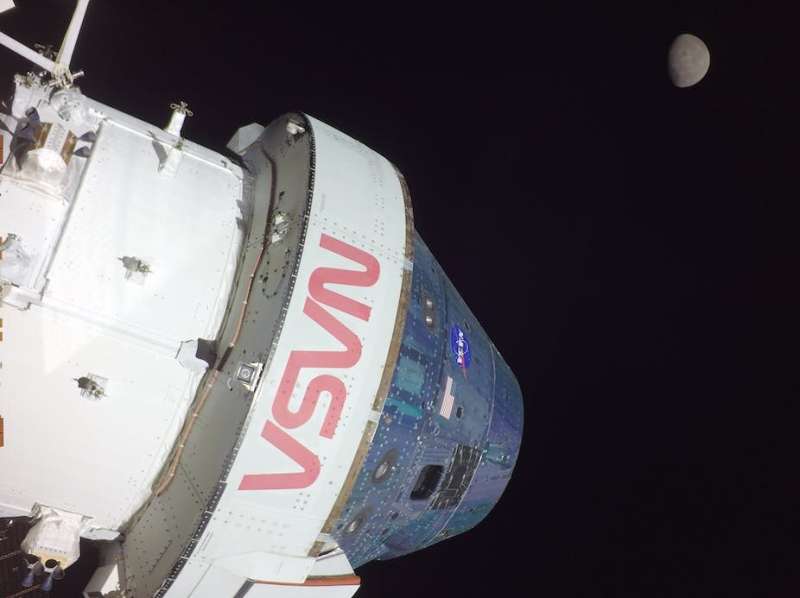
Copernical Team
Tianzhou 4 deploys minisatellite
 China has recently conducted an in-orbit test of a robotic cargo spacecraft to deploy miniature satellites, according to a project insider.
In the test that took place on Nov 14, the Tianzhou 4 cargo ship, which was on its journey back to Earth, deployed a CubeSat named SmartSat 3A into a low-Earth orbit about 380 kilometers above the ground, said Liu Likun, founder and CEO of Smart Satell
China has recently conducted an in-orbit test of a robotic cargo spacecraft to deploy miniature satellites, according to a project insider.
In the test that took place on Nov 14, the Tianzhou 4 cargo ship, which was on its journey back to Earth, deployed a CubeSat named SmartSat 3A into a low-Earth orbit about 380 kilometers above the ground, said Liu Likun, founder and CEO of Smart Satell Milestone for JWST exoplanet observations: atmosphere properties in more detail than ever before
 Observations of the exoplanet WASP-39b with the James Webb Space Telescope (JWST) have yielded a wealth of information about the planet's atmosphere - a whole new level of observational data, and a harbinger of how JWST will shape the study of exoplanet atmospheres in the future. The detailed infrared spectra taken with three of JWST's four instruments contain information about atmospheric chemi
Observations of the exoplanet WASP-39b with the James Webb Space Telescope (JWST) have yielded a wealth of information about the planet's atmosphere - a whole new level of observational data, and a harbinger of how JWST will shape the study of exoplanet atmospheres in the future. The detailed infrared spectra taken with three of JWST's four instruments contain information about atmospheric chemi Artemis: why it may be the last mission for NASA astronauts

Neil Armstrong took his historic "one small step" on the moon in 1969. And just three years later, the last Apollo astronauts left our celestial neighbour. Since then, hundreds of astronauts have been launched into space but mainly to the Earth-orbiting International Space Station. None has, in fact, ventured more than a few hundred kilometres from Earth.
The US-led Artemis programme, however, aims to return humans to the moon this decade—with Artemis 1 on its way back to Earth as part of its first test flight, going around the moon.
The most relevant differences between the Apollo era and the mid-2020s are an amazing improvement in computer power and robotics.
Direct observations of a complex coronal web uncover an important clue as to what mechanism drives solar wind

ESA Navigation portfolio expanded and diversified by Ministerial Council

ESA’s Directorate of Navigation was pledged a total of €351 million by the Agency’s Member States during this week’s ESA Council at Ministerial Level on November 22 and 23. With this funding boost ESA sees its leading role in satellite navigation strengthened with a new programme FutureNAV, the continuation of its innovation programme NAVISP, and the kick-off of the Moonlight initiative for lunar telecommunications and navigation coverage.
Commercialisation of space boosted at ESA Ministerial Council

23 Member and Associate States of the Agency pledged a total 117.6 million euros to ESA’s ScaleUp programme at ESA’s Ministerial Council CM22 to encourage entrepreneurship and commercialisation in the European space sector. This amount exceeds the target funding request by more than 17%, thus confirming the strong support that ESA Member States intend to provide to the development of a strong and sustainable commercial space ecosystem.
Earth from Space: Zaragoza, Spain

The province of Zaragoza, in northeast Spain, is featured in this image captured by the Copernicus Sentinel-2 mission.
China lays out plan for future deep space exploration
 China has made an ambitious road map for its future lunar exploration programs, including an international scientific outpost, according to the programs' chief planner. Wu Weiren, an academician of the Chinese Academy of Engineering, said that the next step in the country's lunar adventure - the Chang'e 6 robotic mission - has been set to land on the moon's far side and will collect and bring sa
China has made an ambitious road map for its future lunar exploration programs, including an international scientific outpost, according to the programs' chief planner. Wu Weiren, an academician of the Chinese Academy of Engineering, said that the next step in the country's lunar adventure - the Chang'e 6 robotic mission - has been set to land on the moon's far side and will collect and bring sa British Paralympian McFall 'inspired' to become astronaut candidate
 John McFall, a British athlete who has competed in the Paralympic Games, has become the first disabled astronaut candidate with the European Space Agency.
McFall, 41, is among 17 new astronaut candidates selected by the ESA from a pool of more than 22,500 applicants from across Europe, the space agency said in a statement.
He was selected to take part in the ESA's Parastronaut Feasibility
John McFall, a British athlete who has competed in the Paralympic Games, has become the first disabled astronaut candidate with the European Space Agency.
McFall, 41, is among 17 new astronaut candidates selected by the ESA from a pool of more than 22,500 applicants from across Europe, the space agency said in a statement.
He was selected to take part in the ESA's Parastronaut Feasibility China's space-based observatory sends first solar image
 China's solar exploration satellite has transmitted its first solar image since being sent to space in October, according to the Purple Mountain Observatory (PMO) based in east China's Jiangsu Province.
The Advanced Space-based Solar Observatory (ASO-S) - nicknamed Kuafu-1 in Chinese - sent hard X-ray imaging of solar flares that broke out at 1:00 a.m. (Universal Time) on Nov. 11, 2022, sa
China's solar exploration satellite has transmitted its first solar image since being sent to space in October, according to the Purple Mountain Observatory (PMO) based in east China's Jiangsu Province.
The Advanced Space-based Solar Observatory (ASO-S) - nicknamed Kuafu-1 in Chinese - sent hard X-ray imaging of solar flares that broke out at 1:00 a.m. (Universal Time) on Nov. 11, 2022, sa 
